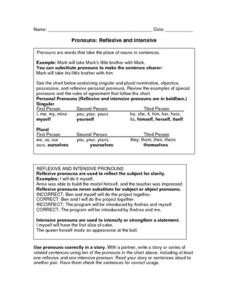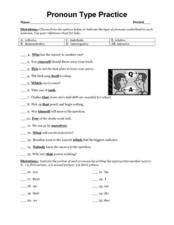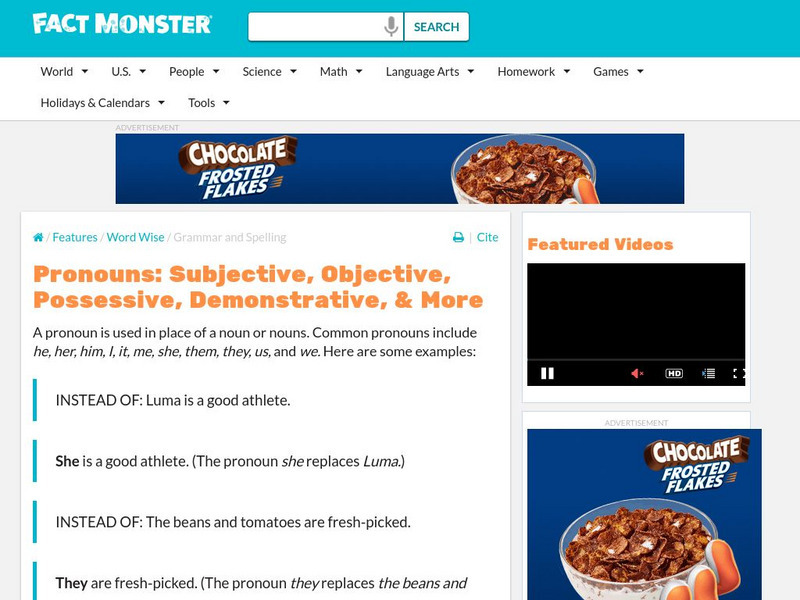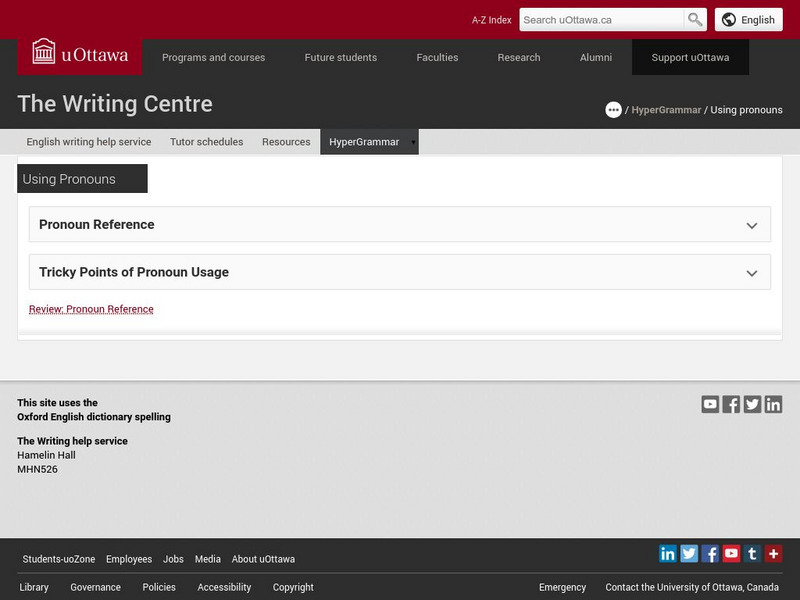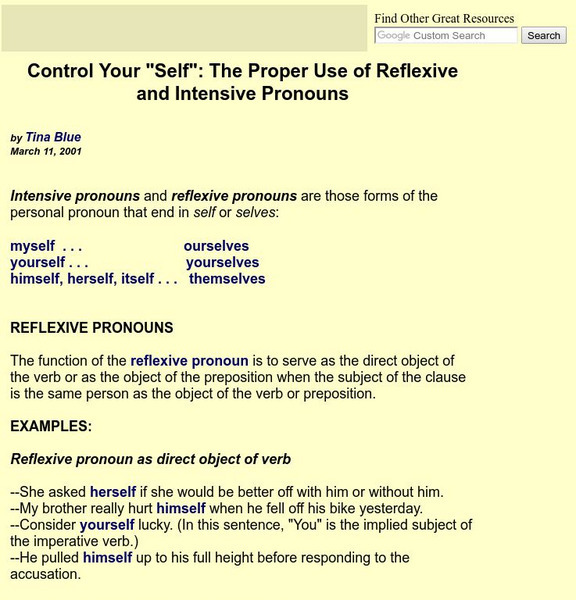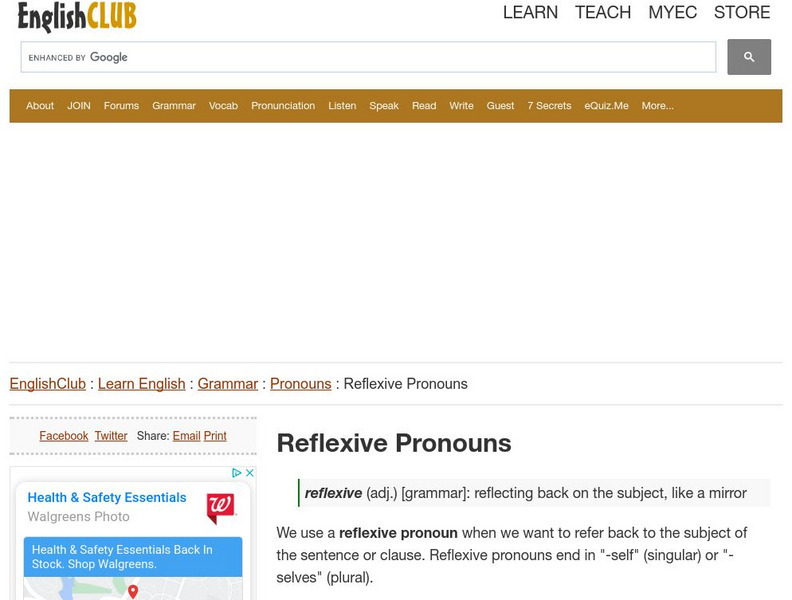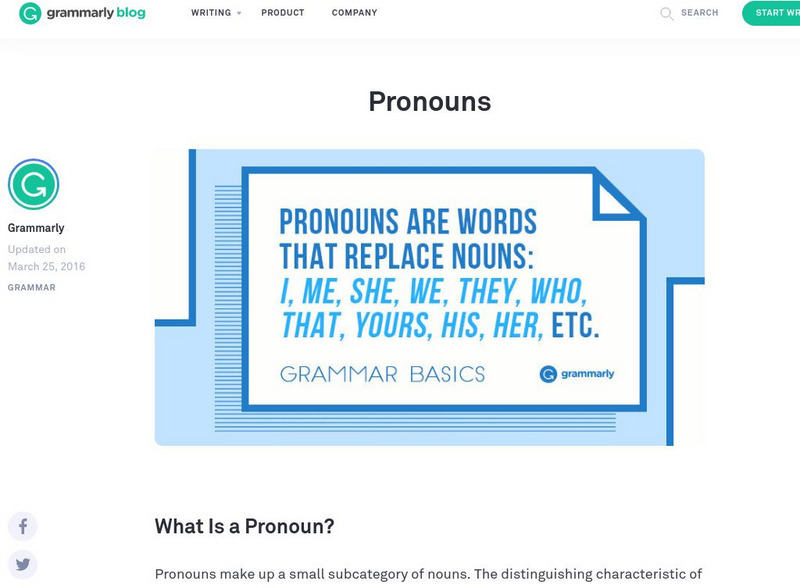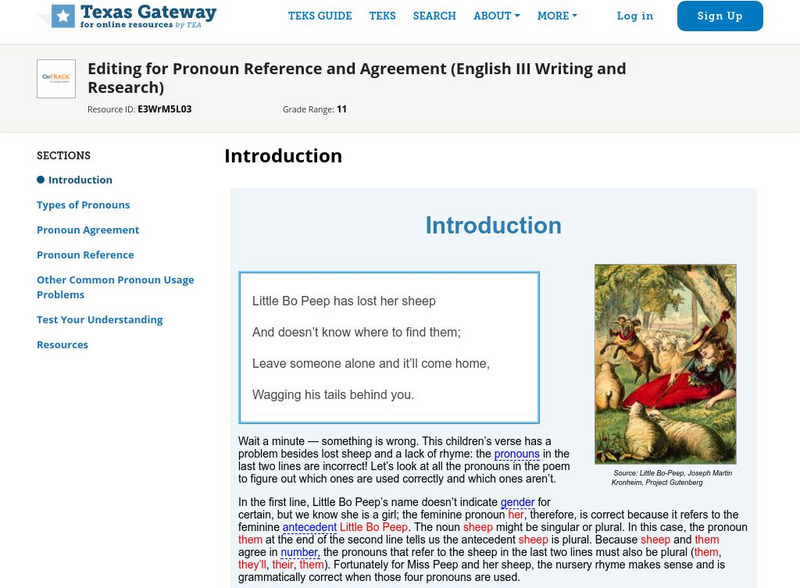Curated OER
Using Intensive Pronouns
Myself, yourself, and himself are intensive pronouns. Get your learners using these pronouns when writing sentences with this series of worksheets which include a reading and discussion section, examples, three practice activities, and...
Curated OER
Pronouns: Reflexive and Intensive
What is the difference between reflexive and intensive pronouns? To find out, review the definitions and examples for various types of pronouns. Then complete several activities that help the class learn to recognize and use pronouns....
Curated OER
Intensive or Reflexive? How to Use Them
I myself am often confused by intensive pronouns but your pupils can work by themselves to gain understanding of reflective and intensive pronouns with this worksheet set. You yourself will benefit from the attached answer key.
Curated OER
Not So Personal Pronouns
There are six types of pronouns to explore! Put on your thinking hat and read about each type: demonstrative, indefinite, intensive, interrogative, and reflexive. This activity comes with two pages of explanations and examples, and it...
Web English Teacher
Reflexive and Intensive Pronouns
Myself. themselves, himself. Class members engage in an intensive study and reflect on the uses of reflective and intensive pronouns.
Curated OER
Reflexive and Intensive Pronouns
Do your young grammarians confuse reflexive and intensive pronouns? Learners are introduced to the definitions of these terms and view examples. Consider using color-coded markers to mark the reflexive and intensive pronouns, as well as...
Curated OER
Pronoun Type Practice
Explore the world of pronouns; it's a lot bigger than you think! With reflexive, indefinite, relative, demonstrative, interrogative, and intensive pronouns, you have to give your class clear, easy to understand explanations. After...
North Iowa
Identifying Kinds of Pronouns
Provide your ESL or ELA pupils with some skills practice for identifying various kinds of pronouns. Comprised of 40 problems and broken into four parts, pupils first underline all the pronouns in each sentence, then identify them as...
Curated OER
Reflected: Using Reflexive pronouns
In this grammar worksheet, students learn about reflexive pronouns in sentence writing. They then use what they read to answer the 7 questions on the page. The answers are located on the last page of the packet.
Curated OER
Noun, Pronoun, Adjective PRACTICE
Designed as a retest practice opportunity, this two-page worksheet has learners look at sentences to identify different pronouns, adjectives, and nouns. Twenty-five out of 38 questions focus on pronouns.
Curated OER
Parts of Speech
In this parts of speech worksheet, students identify nouns, pronouns, verbs, adjectives, and more in sentences. Students complete 30 problems total.
Curated OER
“I Can” Common Core! 6th Grade Language
Help your sixth graders know exactly what is expected of them when it comes to Common Core language standards. Distribute the checklist, which is written in kid-friendly "I can" language, to each child. While most of these standards are...
Towson University
Towson University: Online Writing Support: Pronouns
This entry focuses on the kinds of pronouns including personal, relative, indefinite, demonstrative, interrogative, reflexive/intensive, and singular and plural pronouns. It provides an explanation and examples of each.
Grammarly
Grammarly Blog: Intensive Pronouns
An explanation with examples of intensive pronouns and how they are used in sentences, as well as how they differ from reflexive pronouns.
PBS
Pbs Learning Media: How to Use Intensive Pronouns
Intensive pronouns add needed emphasis to a sentence. While they function similarly to reflexive pronouns, they differ in that the pronoun can be removed without altering the meaning of the sentence. [0:57]
Fact Monster
Fact Monster: Pronouns: Subjective, Objective, Possessive, Demonstrative, Etc.
This grammatical reference shares definitions of each type of pronoun. Each category of pronoun includes several examples. The following types of pronouns are included: demonstrative pronouns, indefinite pronouns, intensive pronouns,...
Towson University
Towson University: Online Writing Support: Self Teaching Unit: Pronoun Case
This lesson focuses on pronoun case including subjective, objective, and possessive case. It provides examples of each and also discusses personal pronouns, reflexive / intensive pronouns, and the use of Who and Whom. It offers links to...
University of Ottawa (Canada)
University of Ottawa: Using Pronouns
Clear and simple explanation of the various types of pronouns, this site is easy to read and follow.
Grammar Tips
Control Your "Self": Reflexive and Intensive Pronouns
This resource explains the proper use of reflexive pronouns -- giving examples of both correct and incorrect usage.
English Club
English Club: Learn English: Grammar: Pronouns: Reflexive Pronouns
An explanation of reflexive and intensive pronouns along with examples, example sentences, and a quiz.
Curated OER
Mc Graw Hill: Language: Pronouns
Learn how to use the varying different types of pronouns in this excercise.
Grammarly
Grammarly Blog: Pronouns
This page focuses on pronouns including definitions, personal pronouns, antecedents, relative pronouns, who vs. whom, demonstrative, indefinite, reflexive and intensive, possessive, and interrogative pronouns. Examples are provided for...
Texas Education Agency
Texas Gateway: Editing for Pronoun Reference and Agreement: English Iii Writing
This lesson focuses on pronoun reference and agreement; it also provides an excellent overview of the types of pronouns with practice exercises.
Quizlet
Quizlet: Point of View Practice for 3rd Grade Match
Point of view terms are included in this review "Match" game. Questions are provided for the first person point of view and the third person point of view.

